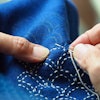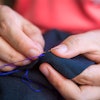Filter Holidays
Find your
next holiday
Filter
Holidays
Sign Up to Emails
Subscribe to our email newsletter and find out the latest news, updates and offers first!
Textiles of Guatemala
Holiday Overview
Join us for a celebration of Guatemala’s rich textile heritage. Explore centuries of tradition and artistry through remote villages and bustling towns, learning about the intricate techniques, vibrant designs and cultures of this fascinating country. Enjoy workshops with renowned textile artist Priscilla Bianchini, local Mayan communities, and your accompanying expert. Guatemala’s colourful tapestry awaits!
Itinerary
Please choose your preferred 16 day itinerary
Please Note: Flight-inclusive packages are available at an extra cost, with flights from London to Guatemala City with 1 piece of checked-in luggage included.
This is the 2026 itinerary.
With our flight-inclusive package, meet Janet Clare and your Tour Manager at a London airport for your flight to Guatemala City. On arrival, we will be met by our guide and driver and transfer to our hotel.
If you have booked our join direct package, meet us at the hotel.
Following a leisurely start this morning, we’ll visit the Guatemalan Textile Centre, a shop specialising in traditional Guatemalan fabrics run by Carlos Izcot and his family for over 45 years.
This afternoon we’ll enjoy our first workshop with Janet.
Enjoy a welcome dinner at a local restaurant this evening.
Included Meals
- Dinner
Highlights
- Workshop
- Guatemalan Textile Centre
Museo Ixchel del Traje Indigena, named after Ixchel, the Pre-Hispanic Mayan goddess of fertility and weaving, collects, preserves, records, and provides education on Guatemalan indigenous textile traditions, highlighting their cultural, technical and artistic value. The collection comprises of woven and embroidered garments, blankets and accessories such as hats and bags. The Mayan people have been creating textiles for thousands of years and the museum also showcases their intricate weaving techniques and vibrant designs. The textiles in the collection are beautiful and decorative and hold significant cultural and historic significance, reflecting the social, religious and economic practices of the indigenous communities of Guatemala.
Our day will continue with an orientation tour of Guatemala City including the Civic Centre area, National Palace of Culture, Metropolitan Cathedral and the Central Market, one of the main textile markets in Guatemala. At the Arte Maya Museum, we’ll take a tour through Guatemalan history visiting one of the best collections of pre-Hispanic and colonial art in the country.
Afternoon transfer to Antigua Guatemala.
Included Meals
- Breakfast
Highlights
- Arte Maya Museum
- Museo Ixchel
- Guatemala City Tour
This morning, we’ll enjoy the company of a group of Cakchiquel Mayan ladies from the San Antonio Aguas Calientes Community, who will share their knowledge of traditional weaving techniques on the backstrap loom.
This afternoon we’ll enjoy our second workshop with Janet.
Included Meals
- Breakfast
Highlights
- Cakchiquel Weaving Workshop
- Workshop
Antigua Guatemala is a city in the central highlands of Guatemala. It was the capital of the Captaincy General of Guatemala from 1543 to 1773, with much of its Baroque-influenced architecture and layout dating from that period. These characteristics had it designated as a UNESCO World Heritage Site in 1979. We’ll discover the secrets of this fascinating city on a walking tour, visiting the colourful market and main historical monuments.
This afternoon we’ll enjoy a sewing machine workshop with Priscilla Bianchi. A Guatemalan native, Priscilla is a textile artist, designer, author, international teacher and a unique personality in today’s fibre arts world. Her innovative, one-of-a-kind art quilts unite cultures by combining the richness and ethnic appeal of Mayan Guatemalan hand-woven textiles with American quilt making techniques. Her main inspiration for her geometric abstract work comes from Mayan Guatemalan traditional textiles and costumes.
Included Meals
- Breakfast
Highlights
- Antigua Guatemala Tour
- Workshop with Priscilla Bianchi
The Indigo Project by Olga Reichie is a sustainable eco-fashion business in the village of San Juan El Obispo, dedicated to creating stylish and environmentally conscious clothing whilst supporting local artisans in Antigua. The project strives to use eco-friendly and sustainable practices throughout its supply chain and one of its unique features is its use of natural dyes, extracted from plants and other natural sources. This morning we’ll enjoy a workshop here, learning how to start an indigo vat from scratch and dye a shawl using the shibori technique. We’ll also learn about indigo as a dye and the history of indigo in Guatemala.
Lunch at a restaurant in San Juan El Obispo is included today.
We then return to Antigua Guatemala for some free time to explore the city at your own pace or relax in the hotel.
Included Meals
- Breakfast
- Lunch
Highlights
- Indigo Dyeing Workshop
- Antigua Guatemala
Today we leave Antigua Guatemala and travel to Lake Atitlan. On route we’ll stop at Tecpán and Solala.
In Tecpán, we’ll visit Iximche archaeological site, a Mayan Cakchiquel city founded in 1463, less than a century before the arrival of the Spaniards. The city played a decisive role in the Spanish conquest of this region of Guatemala. Located amongst pine forests, we’ll view the remains of the city, whose ceremonial plazas and temples still attract worshipers today.
In Solala we’ll visit the traditional market, a vibrant and bustling hub of commerce and culture. The market offers a unique opportunity for us to experience the sights, sounds and flavours of Guatemala’s indigenous communities. From handmade textiles and pottery to fresh produce and traditional cuisine, Solala market is a treasure trove of local traditions.
Continue to Lake Atitlan. This afternoon, enjoy our third hand-stitching workshop with Janet at the hotel.
Included Meals
- Breakfast
Highlights
- Workshop
- Iximche Archaeological Site
- Solala Market
San Juan La Laguna, located on the shores of Lake Atitlan, is rich in colour and traditions. In recent years, the town has become well known for its weaving, which has become an important source of income for local women’s associations.
Over a decade ago, a group of women in the town came together to preserve their traditional weaving techniques. They realised that the art of weaving was in danger of disappearing and that younger generations needed to learn the craft. The women also wanted to create a sustainable source of income for themselves and their families. The women’s associations in San Juan La Laguna use ancient weaving techniques and tools to create beautiful textiles. The looms they use are made of wood and often handcrafted by women. They use natural dyes from plants and insects, such as cochineal, a beetle that lives on cacti. The dye extracted from cochineal produces a deep red colour and is highly prized.
This morning, we'll visit a family-owned farm cultivating cochineal. Here we’ll enjoy a workshop on the textiles of the Tzutujil people and the use of natural dyes. The Tzutujil are native American people, one of the 22 ethnic groups that live in Guatemala.
This afternoon we’ll explore the picturesque village of Santiago Atitlan.
Included Meals
- Breakfast
Highlights
- Lake Atitlan
- Tzutujil Textile Workshop
Today we’ll visit Chichicastenango Market and witness the atmosphere of this ancient commercial event. Here, in addition to the colourful textiles and handicrafts on sale, you can experience the mixture of cultures that has resulted from the arrival of the Spanish in South America and the historic traditions of the Mayan people.
We’ll also visit Las Morerias, where the traditional outfits are made for the people who participate in the traditional folkloric dances. Here, dancers can buy or rent masks, clothing and accessories.
Lunch will be served in a local restaurant.
We return to our hotel for our fourth hand-stitching workshop with Janet at the hotel.
Included Meals
- Breakfast
- Lunch
Highlights
- Workshop
- Las Morerias
- Chichicastenango Market
Today we leave Lake Atitlan and travel to Quetzaltenango, in Guatemala’s western highlands. On route we’ll visit Santa Catarina and San Antonio Palopó, two villages located on the shores of Lake Atitlan. Both towns are known for their traditional textiles and handicraft production, passed down from generation to generation.
In Santa Catarina, the traditional dress for women consists of a huipil, a long-sleeved blouse made of cotton or wool and a corte, a woven skirt. The textiles used in huipil are intricately woven and embroidered with colourful designs representing the community’s colourful identity. The men in the village also wear traditional clothing, consisting of a woven shirt and pants.
San Antonio Palopó is famous for its pottery production, which dates back to the pre-Colombian era. The village is located on clay-rich hillside, providing raw pottery material. The clay is hand-shaped into pots, plates and vases and then fired in wood-burning kilns. The pottery is decorated with intricate designs and bright colours, making it a popular souvenir for tourists.
Included Meals
- Breakfast
Highlights
- Santa Catarina and Santa Antonio Palopó
A relaxed start to the morning as we visit Almolonga Market, one of the best vegetable markets in Central America. The market offers the perfect opportunity for taking some photographs and people watch as local families go about their day.
In San Andrés Xecul, we’ll visit the fabulously ornate church. Its façade is painted sunflower yellow and decorated with detailed mouldings of saints and plants in vivid red, green and blue, a Guatemalan-Colonial fusion of devout catholic beliefs and vibrant Mayan customs.
Just outside of Zunil, a small village surrounded by lush mountains, we’ll visit Georginas Hot Springs and Natural Baths, where we’ll take some time out to relax and swim in its naturally warm waters.
Transfer back to Quetzaltenango for a cultural tour visiting the main monuments of the city.
Included Meals
- Breakfast
Highlights
- Almolonga Market
- Fuentes Georginas
- Quetzaltenango City Tour
- San Andrés Xecul
We depart Quetzaltenango today and travel to Coban. Coban is a highland city in Guatemala’s central cardamom and coffee growing region. This long, scenic journey will take approximately 7 hrs, but we will stop on route at Totonicapan markets to see the different textiles and ceramics on offer.
Included Meals
- Breakfast
Highlights
- Totonicapan Markets
- Coban
Coban is a fascinating town for textiles. The costumes of the indigenous people from the Las Verapaces area are among the most colourful in the country. In Alta Verapaz, fabrics for huipiles (tunics) are made using the the backstrap loom. We will see that motifs on the fabrics of the Kekchi and Pocomchi indigenous Mayan communities differ from one area to another and learn about the three different weaving techniques used here; pic’bil, tz’ul and qu’embil whilst enjoying a workshop and lunch with artisans from the communities of Chicoj and Sanimtaca.
Included Meals
- Breakfast
- Lunch
Highlights
- Kekchi Textile Workshop
This morning we’ll enjoy our final workshop with Janet in the hotel before transferring to Guatemala City for a farewell dinner.
Included Meals
- Breakfast
- Dinner
Highlights
- Workshop
If you have booked our join direct package, your tour ends after breakfast.
With our flight-inclusive package, enjoy free time in Guatemala City. We include your transfer to the airport. From here, you will board your return flight home.
Included Meals
- Breakfast
Highlights
- Guatemala City
Arrive back in London.
Tour notes: You will need to have a good level of fitness to get the most out of this holiday. We therefore do not recommend this tour for anyone with mobility problems. The itinerary involves a significant amount of walking whilst sightseeing each day, sometimes in warm temperatures and often on rough ground and including steps. Whilst sightseeing is taken at a leisurely pace, for the enjoyment of everyone in the group you should be able to keep up with your fellow travellers.
Accommodation
You will stay for 3 nights at the 4-star Wyndham Garden, Guatemala City, 4 nights at the 4-star El Pensativo Boutique Hotel, Antigua Guatemala, 3 nights at the 4-star Hotel Atitlan, Lake Atitlan, 2 nights at the 3-star Hotel Pension Bonifaz, Quezaltenango and 2 nights at the Park Hotel Resort, Santa Cruz Verapaz.





























